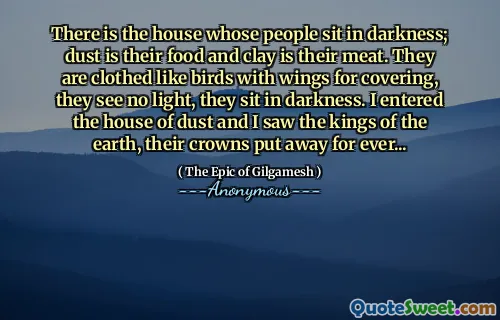
There is the house whose people sit in darkness; dust is their food and clay is their meat. They are clothed like birds with wings for covering, they see no light, they sit in darkness. I entered the house of dust and I saw the kings of the earth, their crowns put away for ever...
This evocative passage from The Epic of Gilgamesh offers a profound meditation on mortality and the universal destiny of humankind. The imagery of a 'house where people sit in darkness' symbolizes death as an inevitable, all-encompassing shadow that envelops everyone regardless of status or might. The metaphorical depiction of nourishment being 'dust' and 'clay' accentuates human return to the earth, reminding us that life and death are intrinsically linked to the natural world.
The portrayal of the inhabitants as 'clothed like birds with wings for covering' invokes a haunting and surreal vision—possibly alluding to the fragility and impermanence of the physical form, or even the soul's journey beyond mortal existence. Witnessing the 'kings of the earth' with 'their crowns put away forever' is a powerful commentary on the futility of earthly power and grandeur. No matter one's earthly achievements or wealth, death renders all distinctions meaningless.
This passage invites reflection on the common destiny awaiting every person, offering a humbling perspective on life’s temporality and the vanity of earthly pride. The motif of darkness and absence of light also underscores the mysterious, often terrifying nature of the afterlife in ancient thought.
Ultimately, the excerpt encourages readers to contemplate mortality and the legacies they choose to leave behind beyond material power or status. It serves as a timeless reminder that death is the great equalizer, thus prompting a meaningful examination of what constitutes genuine significance in life.






